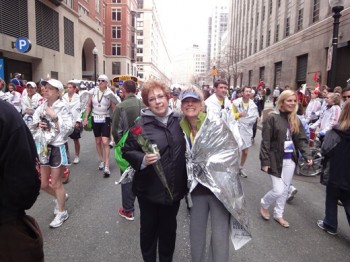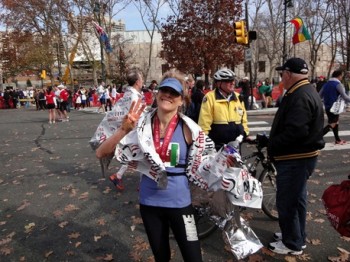The night before my key race of the year, this is the notice arriving on my cell:
Advisory From Boston Marathon MEDICAL DIRECTORS to Entrants in the 2012 Boston Marathon
Sunday, April 15, 2012 as of 4:30 p.m.
The weather situation continues to be a significant concern for Boston Marathoners. We have determined that the race will occur in a "red zone" which is considered an increased risk but acceptable for high-level elite runners. However, it is not considered safe for unfit and novice runners.
We strongly recommend that unless you have met qualifying times for this race that you accept the deferment option from the B.A.A.
Anyone who has not run a qualifying time should also very strongly consider the deferment option.
Again, if you have any medical problems or if you under-trained, then please do not run this marathon.
Those who are running the race should run much slower, adding several minutes to your per mile pace.
Also important, please be sure to complete the emergency medical contact information on the reverse side of your bib.
Remember, unless you are acclimated to the weather conditions forecast for Monday, you should not run.
For those very fit athletes who decide to run, you should take significant precautions:
- Run at a slower pace and maintain hydration.
- You should frequently take breaks by walking instead of running.
- Heat stroke is a serious issue and is related to intensity of running as well as the heat and humidity.
- Good hydration is important but over hydration is also dangerous.
- Thirst is an indication that you are under-hydrated. You should maintain hydration levels slightly greater than your hydration program in your training, but not excessively so. Over-hydration can cause severely low sodium, known as hyponatremia.Even the fittest athletes that take precautions can still suffer serious heat illness. Recognizing symptoms of heat illness in yourself and others is critical. This may include headaches, dizziness, confusion, fatigue, nausea and vomiting. If you experience any of these, stop running immediately and if symptoms persist seek medical attention.
Nutritional needs for a hot race.
- Hydrate the day before and drink 20 oz of water before bed, the night before the race.
- Consume potassium rich foods the day before and morning of the race.
- Keep core body points cool before you over heat: The back of the neck, the wrists.
- Dump water over your head, on your wrists, hands (they will swell), and neck.
- Use ice to cool you down if available.
- Drink an electrolyte drink such as Gaterade instead of just water. Too much water can cause hyponatremia, just as fatal as heat stroke.
- Slow your pace. It's not a day for a PR.
1 – 5 miles: Although the course drops sharply, it didn’t feel so easy this year. The crowds were in full force and the fiddler players were out as were the bikers at TJ’s Lounge. This was suppose to be where everyone had so much energy and felt great. On this day, I was looking at the Dunkin’ Donuts thinking of jumping out of the race and calling Ted for a pick up, thinking I never should have crossed that starting line. This was a bad idea!
6 – 11 miles: A tough part of the course as it levels out. There was very little shade but the crowd was handing out more ice and it was getting a little easier to make it mile by mile. I was cooling myself down with ice and water, I was taking in a lot of Gaterade and water but keeping a good balance. I was on schedule with my fueling, gels, Endurolyte tabs, and I was moving forward, slow but steady. I made a quick porto-potty stop then took off running.
*By the way, good time to check your fueling based on making a pee
stop. If your clear as water, DANGER zone. You’re getting too much water and
need to worry about hypernatremia.
If you’re urine is very dark, you need to drink more because you’re
dehydrated.
12 – 16 miles: Wellesley wasn’t quite a scream tunnel on this day. The small med tent was already filled. I was still contemplating dropping out at the half. When crossing the 13.1 mat, saw my time at 2:04 and thought “My longest half marathon ever.” Discouraging but based on seeing the suffering other runners were going through and the way I felt, there was nothing to be done. I also knew if I made it to mile 16, I could make it all the way and forged ahead.
17 – 21 miles: The Newton Hills. By this time I was ready to walk the length of every hill. I had been jogging up most of the hills, at least part way and running the flats and declines. The sharp right turn onto Commonwealth by the big red brick building was relief to my eyes. I was ready for the hills, not to run but just to get over them and get the hardest part of the course out of the way. I did jog some of the first hills but walked all of Heartbreak.
*So sad to walk Heartbreak. That’s the hill you are determined to conquer in your training for Boston. Monday, April 16th, that hill conquered many of us. There is a big display that shows the runners as you all proceed up the hill. As I looked at it, and then looked around me, there were more walkers than runners. This was Boston, we should be running but we couldn’t. The heat had tapped all the energy from our bodies and so we walked.
22- 26.2 miles: Those last miles were hot and even more challenging than the hills. The crowd support was once again amazing as they tended to fallen runners and urged us on to finish this thing. There was one situation that engraved itself in my mind: An older athlete was being dragged to the side, out of the way from on coming runners. He was completely out of it and his color was grey. I was so afraid for him.
As for me, my body felt good. My hands were still very swollen, my Garmin felt tight, but I was doing a great job at cooling myself and not exerting myself. I thought I could make an effort and run a bit harder but instead continued to run- walk since that last stretch to the finish on Boylston Street was a RUNNING must! I walked up Hereford and turned onto Boylston at a run. I could see the finish getting closer, it was going to happen.It was a challenge and this body did it!






